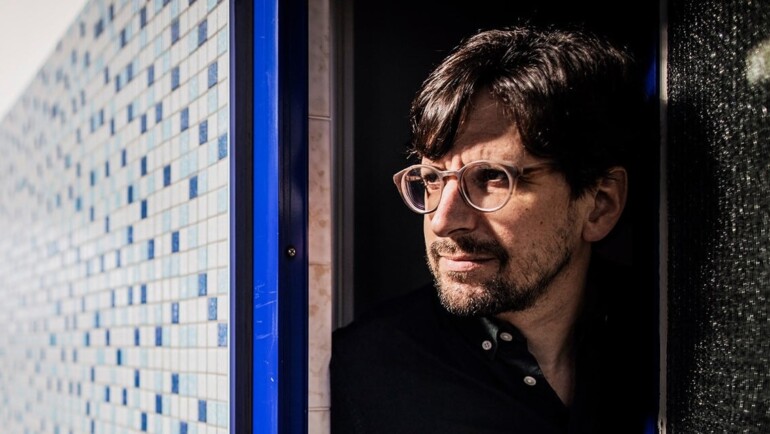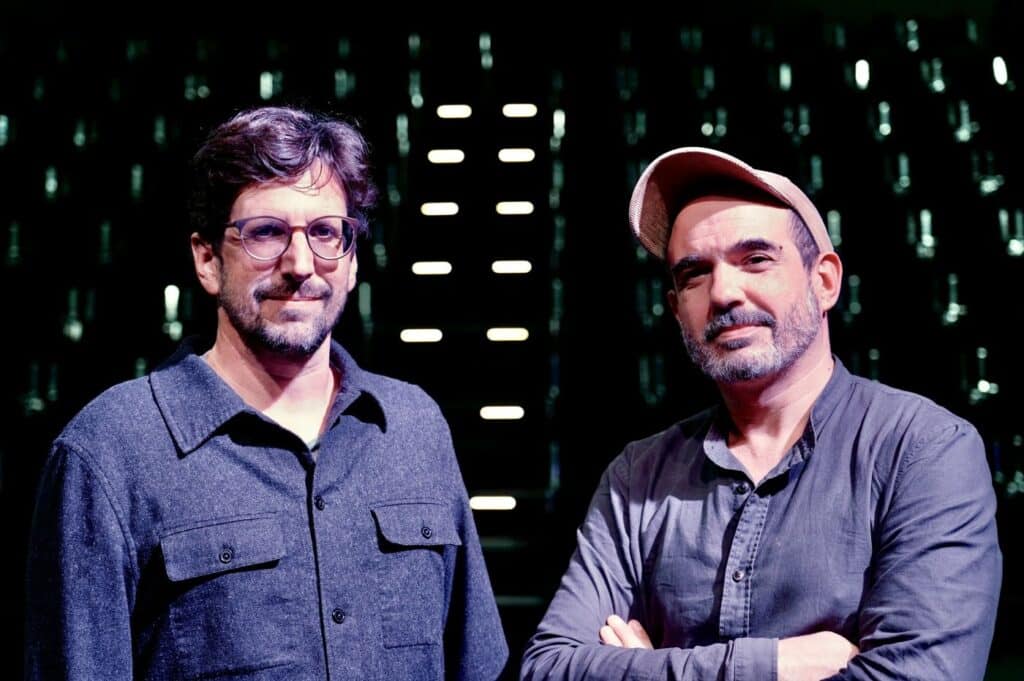
In his 12 years in Vienna, Swiss bassist Andreas Waelti has become a fixture of the local jazz scene and proved himself an unusually versatile musician. Now that versatility will be further tested: Waelti has been tapped to take over artistic leadership of the storied Swiss jazz label Unit Records, a role he will share with his countryman and co-instrumentalist Luca Sisera. mica‘s Michael Ternai recently spoke to him about the passing of the torch, the European jazz scene, and his future plans for the label.
“Jazz is a Very Small Boat”
How did you come to the honor of being part of the artistic leadership for Unit Records?
Andreas Waelti: I was in contact with the former artistic director, Harald Haerter, off and on over the years; among other things, Unit has released a lot of albums on which I appeared as a sideman. We started talking about him passing the torch at Unit a year ago, and after thinking about it, I contacted the Swiss bassist and composer Luca Sisera. Luca and I are both well connected – that was essential for my vision. Jazz and improvised music is a very small boat, and we’re all going to have to work together if we want to accomplish anything.
So you knew immediately that you wanted to work with a partner.
Andreas Waelti: I knew it would make sense, and it was clear from our first talk that Luca and I had a similar vision for the label’s future. We knew each other from Switzerland, and we’ve worked together now and then over the years. I made videos last year for my solo album Lowdown, which Luca must have seen, and he called me out of the blue. At first, I figured he needed something; when bassists call one another, it’s usually either about their setup or because they need to borrow something, like an amp – or a bass. [laughs]
As it turned out, he had written a composition for his band and symphony orchestra, and he wanted me to play bass in the quintet so he could lead the rehearsals. It was an honor; it’s pretty rare that you get asked to sub for someone in their own band. I really enjoyed working with him, and it gave me the idea to ask him to partner with me.
Did the label have a list of candidates for the position?
Andreas Waelti: Harald had been thinking about retiring for a while, and they had talked to a range of people. It took a while for Harald to decide to finally place the label in someone else’s hands, though. It was very important to him that Unit continue as an independent entity – it’s his life’s work, so to speak, and a piece of Swiss music history as well.
You grew up in Switzerland, lived in Berlin for seven years, and now you’ve been in Vienna for twelve – you’re familiar with those music scenes, as is Luca. Asking the two of you was a logical decision.
Andreas Waelti: Absolutely! I hope so. [laughs] Our goal is to make the most of our connections and our ‘insider’ status. Since we’re both active musicians, we have our ears to the ground, so to speak; we know what the scene needs. Luca is very well connected in Switzerland, much better than I am; I’ve been away for a long time. We both know a large part of the German scene, and I’m well established in Austria. The change at Unit is a chance for the Austrian creative music scene, among other things; it offers a direct connection to an international label concentrating on jazz and improvised music.
“We want to bring the different scenes together”
For Unit, it’s the end of an era. What’s important to keep from the label’s past? And what new ideas are you bringing to the job?
Andreas Waelti: Basically, we want to encourage the German-speaking scene to work more closely together. We want to place more of a focus on quality, release music that’s current and authentic, music that moves people and has a certain urgency. We want to hone Unit’s artistic profile without narrowing it stylistically: everything will be categorizable as ‘creative music’ – not just jazz or jazz-adjacent music, but experimental music as well. Most of all, it has to be music that catches our ear. At the same time, we want to bring the different scenes – Vienna, Zurich, Cologne, Bern, Berlin – closer together, in the sense of “Unit” and “united”.
Harald started a concert series called “Unit Live!”, which we want to continue in various European cities, starting in the German-speaking countries. When an Austrian band plays in Berlin, not a lot of people care…but if you pair them with a good Berlin band that’s also on Unit, and then you do the reverse in Vienna, you’re more likely to attract interest, and everybody wins.
So one of your goals is establishing the German-language jazz scene as a brand.
Andreas Waelti: I wouldn’t put it that way. The Unit catalogue certainly has a lot of acts from the German-speaking scene, but that’s not all. There are acts from French Switzerland and France as well, and we definitely want to push that in the future. Unit is historically a Swiss label, but its musical concept has always been European. Plus, there have always been exceptions – there are releases from the USA as well. We won’t rule that out in the future, but we do see Unit primarily as a European label.
How do you see the challenges facing a jazz label today in terms of the physical form in which albums are released? Up until recently, jazz artists were still making a lot of CDs.
Andreas Waelti: That’s definitely going to change; I’m curious to see how things develop. We definitely want to concentrate as much as possible on vinyl and digital releases going forward. We all know that you don’t really make money on record sales any more, but vinyl is definitely coming back.
“We’ve never done that, and we never will”
The Unit Records business model is a little different from other labels, isn’t it?
Andreas Waelti: Absolutely. Unit originally started as a musicians’ initiative, so the artists do fund the production – but they also retain 100% of physical sales and the copyrights. There are no publishing deals where the artist has to give up part of the rights to their music – unfortunately, that’s become pretty commonplace among German labels. But Unit has never done that, and we never will. Luca and I are musicians, too, and we have no plan to force artists to share their intellectual property rights as part of a distribution contract.
Another key word in the press release is sustainability. What does that mean in the context of the label?
Andreas Waelti: I think the issue of sustainability is extremely important, both in the physical and the digital realm. Vinyl production is obviously a big issue, when you think about the resources involved. It’s insane. I know a lot of pressing facilities are trying to go greener now with recycling, upcycling, and heat generation. There are a few pressing plants now that are CO2-neutral. We want to do that with our artists as well: for instance, some labels plant a tree or two for every production. You can also focus on which platforms you use for data transfer. I’m not going to name any names, but it’s common knowledge that there are various options now for how you send data back and forth. And we certainly won’t be flying people back and forth for Unit Live! concerts. As much as possible, our artists will travel by train.

Have the two of you officially taken up your positions yet?
Andreas Waelti: We had a kind of transition phase until the end of October, where Harald Haerter was still assisting us. If I know Harald, though, he’ll continue to be there for us whenever we have questions. The label is now owned by Unit Records GmbH, a company we started.
It’s quite a challenge to be responsible for a 40-year-old legacy. There’s a lot of tradition in the label. What are your first steps going to be?
Andreas Waelti: We’re already in contact with new artists we want to release on Unit – and I can already say that a few really exciting albums are coming out early next year, including some well-known names. In November, we’ll begin realizing, step by step, the ideas we have for the future. We want to get the whole live project going; we’ve also got special editions and a subscription service planned. Financing is also a big issue, of course; there are some structural things we want to address; new ideas for booking and PR…we’ve got our work cut out for us.
Thank you for your time!
Michael Ternai, translated from the German original and edited by Philip Yaeger.
